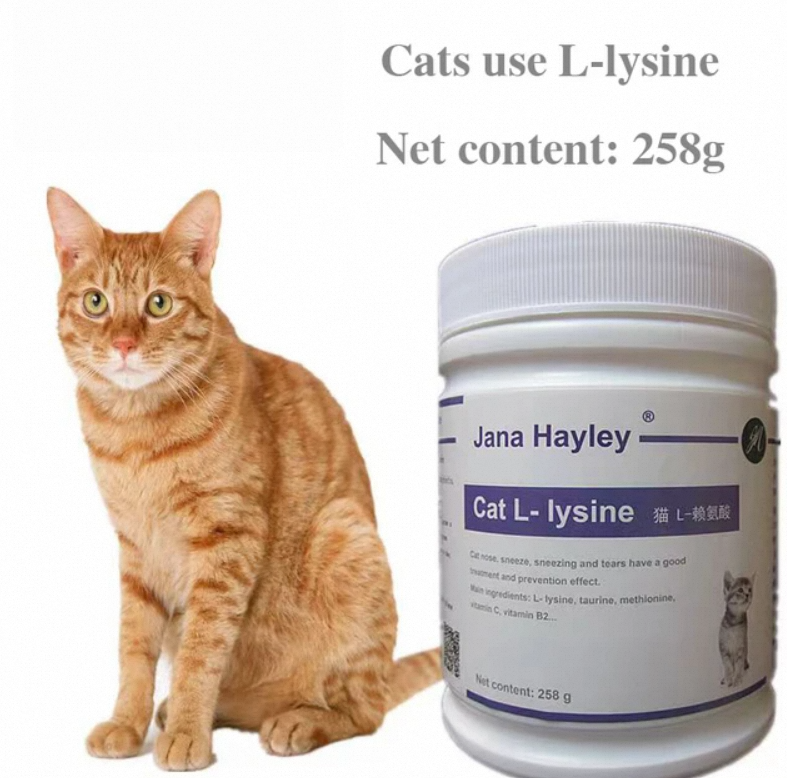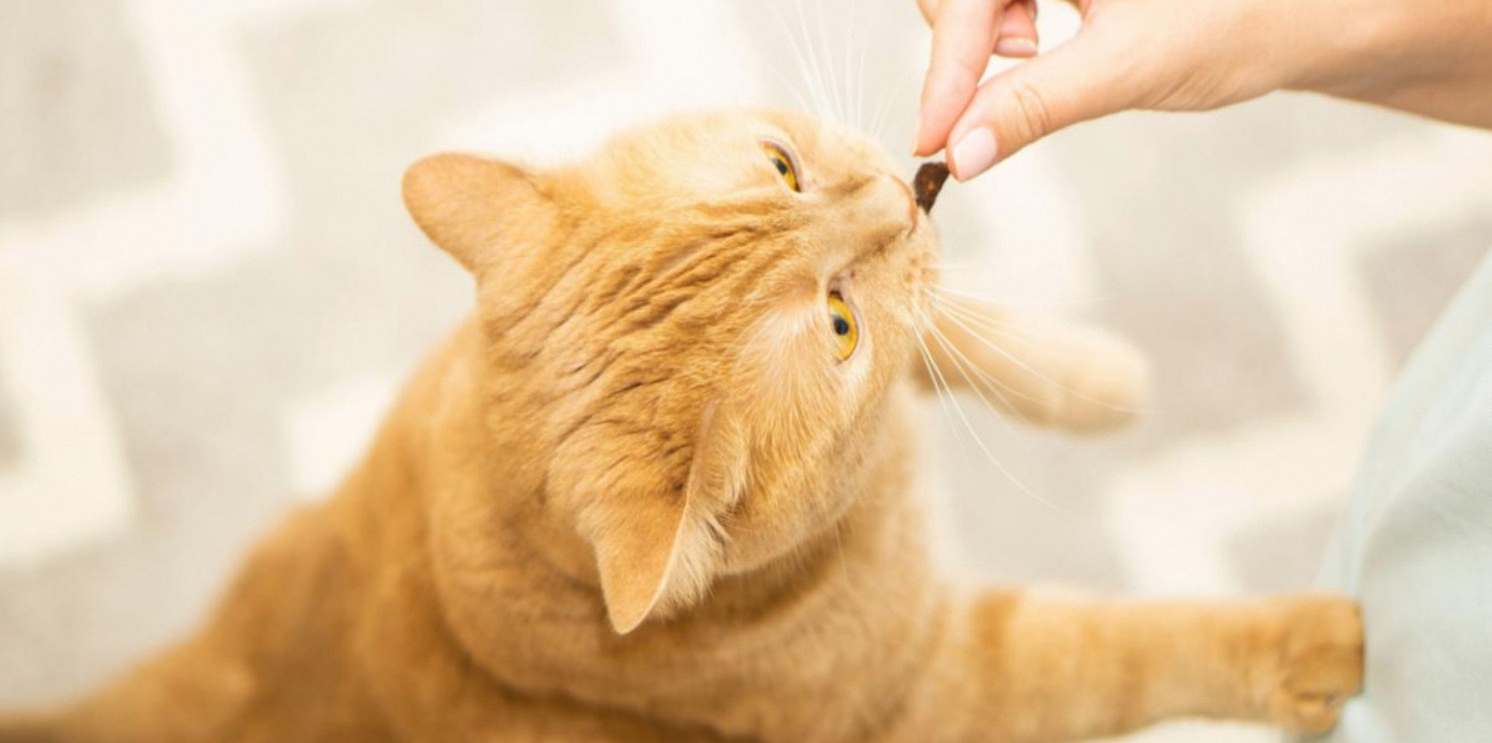Lysine is an essential amino acid and it plays a vital role in a cat’s health. As obligate carnivores, cats have unique dietary requirements, and lysine is one such crucial nutrient they rely on. In this blog, we will explore the significance and benefits of lysine for cats. We’ll also discuss the proper administration and any potential side effects. By understanding more about lysine in a cat’s diet, we can ensure their optimal health status easier. Let’s have a look.
In This Article
What is Lysine?
 Cats cannot produce lysine on their own and must obtain it through their diet. For Lysine is an essential amino acid. Lysine is considered as one of the building blocks of protein and is involved in numerous biological processes within a cat’s body.
Cats cannot produce lysine on their own and must obtain it through their diet. For Lysine is an essential amino acid. Lysine is considered as one of the building blocks of protein and is involved in numerous biological processes within a cat’s body.
Lysine is responsible for producing various proteins, enzymes, and antibodies that are essential for the proper functioning of a cat’s immune system. It aids in collagen formation, which is crucial for maintaining healthy skin, coat, and connective tissues. Additionally, lysine plays an important role in absorbing calcium, supporting bone health and strength.
If there’s a lack of lysine in cats’ diet, they may meet various health issues. Such as a weakened immune system, slow wound healing and poor coat quality.
Benefits of Lysine for Cats
Here are some key advantages of lysine supplementation for cats.
 Stronger Immune System: Lysine plays a crucial role in supporting cats’ immune system. It helps stimulate the production of antibodies that fight off infections and viruses. Lysine has been particularly shown to be effective in managing feline herpesvirus (FHV-1) infections, a common cause of respiratory and ocular symptoms in cats.
Stronger Immune System: Lysine plays a crucial role in supporting cats’ immune system. It helps stimulate the production of antibodies that fight off infections and viruses. Lysine has been particularly shown to be effective in managing feline herpesvirus (FHV-1) infections, a common cause of respiratory and ocular symptoms in cats.
Management of Feline Herpesvirus (FHV-1) Infections: Lysine supplementation has been found to reduce the severity and duration of flare-ups associated with FHV-1. It is helpful to inhibit the replication of the virus and can alleviate symptoms of sneezing, nasal discharge, and conjunctivitis.
 Upper respiratory infection is a common problem for cats. Supplementing a certain amount of lysine is helpful to alleviate the condition. In addition, cat owners need to provide their cats with a clean environment to reduce the spread of pathogens. Also, try to gently clean your cat’s nasal passages with a warm saline to reduce congestion and runny noses. As an extra note, upper respiratory infections are very contagious, so avoid contacting with other cats to prevent the spread of pathogens.
Upper respiratory infection is a common problem for cats. Supplementing a certain amount of lysine is helpful to alleviate the condition. In addition, cat owners need to provide their cats with a clean environment to reduce the spread of pathogens. Also, try to gently clean your cat’s nasal passages with a warm saline to reduce congestion and runny noses. As an extra note, upper respiratory infections are very contagious, so avoid contacting with other cats to prevent the spread of pathogens.
Collagen Production and Skin Health: Lysine is involved in collagen synthesis, which is essential for maintaining healthy skin and a shiny coat. Adequate lysine levels promote wound healing and can help cats with skin conditions, allergies, or injuries get healthy more effectively.
Bone Health and Calcium Absorption: Lysine contributes to calcium absorption, which is vital for maintaining strong bones and teeth. If your cats absorb enough lysine, their bone growth will be good. And as for older cats, their skeletal will be kept in strength.
Stress and Immune Support: During times of stress or illness, a cat’s lysine requirement may increase. It’s useful to supply lysine during these periods that kittens can become healthy quicker.
Potential Side Effects and Precautions
While lysine is generally considered safe for cats, it is important to learn potential side effects and necessary precautions when using it. Here are some important points to consider.
 Allergic Reactions: Although it could be rare, some cats may have an allergic reaction to lysine. If you notice any signs of an allergic response, such as itching, swelling, or difficulty breathing, please stop supply and consult with a veterinarian.
Allergic Reactions: Although it could be rare, some cats may have an allergic reaction to lysine. If you notice any signs of an allergic response, such as itching, swelling, or difficulty breathing, please stop supply and consult with a veterinarian.
Digestive Upset: In some cases, cats may meet digestive issues such as diarrhea or vomiting when having lysine supply. If these symptoms occur, it is advisable to reduce the dosage or temporarily discontinue supply.
Interaction with Certain Medications: Lysine supply may interact with certain medications, especially antiviral drugs. It is important to inform your veterinarian about any medications your cat is eating to avoid bad potential interactions.
Balanced Diet: Lysine can not replace a balanced and nutritionally complete diet. It is essential to provide your cat with a well-rounded diet that meets their all nutritional requirements, including lysine.
About L-lysine
The difference between lysine and L-lysine lies in their molecular structure.
Lysine is an essential amino acid that is naturally found in various protein sources such as meat, fish, poultry, and dairy products. It occurs in two forms: L-lysine and D-lysine.
 L-lysine is the biologically active form of lysine that can be utilized by the body. Also, it is the form commonly found in dietary supplements and is the one that provide the benefits associated with lysine supplementation. When referring to lysine in the context of supplementation or its benefits for cats, it generally implies L-lysine. L-lysine is the form that is readily available for use by the body, contributing to the various health advantages that lysine offers.
L-lysine is the biologically active form of lysine that can be utilized by the body. Also, it is the form commonly found in dietary supplements and is the one that provide the benefits associated with lysine supplementation. When referring to lysine in the context of supplementation or its benefits for cats, it generally implies L-lysine. L-lysine is the form that is readily available for use by the body, contributing to the various health advantages that lysine offers.
On the other hand, D-lysine is the mirror image isomer of L-lysine and is not biologically active in the same way. It is not typically found in natural food sources or used in dietary supplements.
It is essential to ensure that when purchasing lysine supplements or discussing lysine with a veterinarian, you are referring to L-lysine specifically, as D-lysine does not provide the same benefits.
